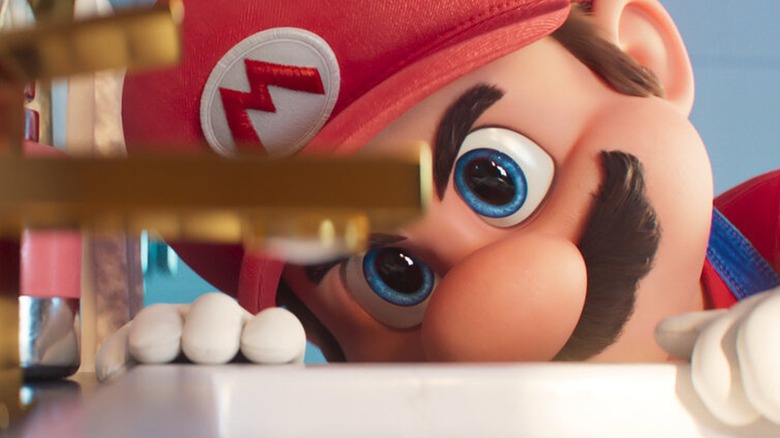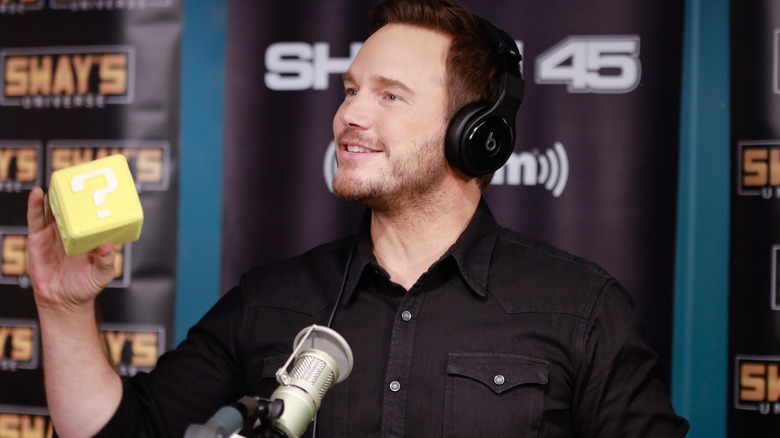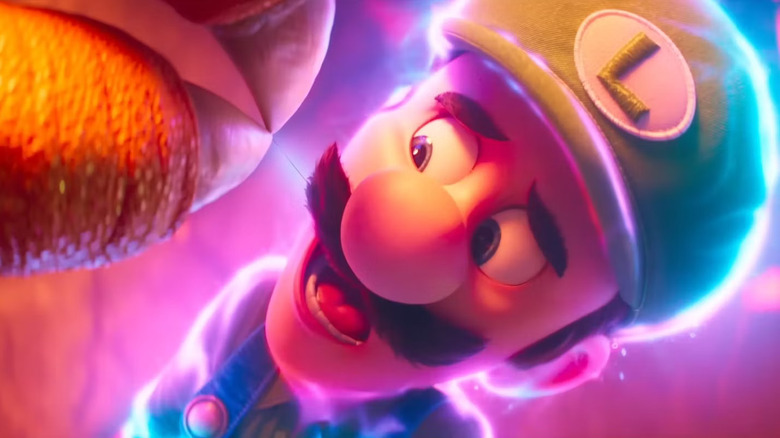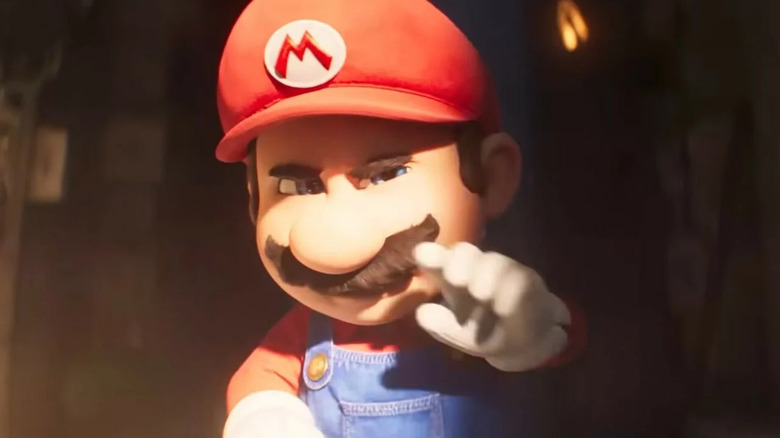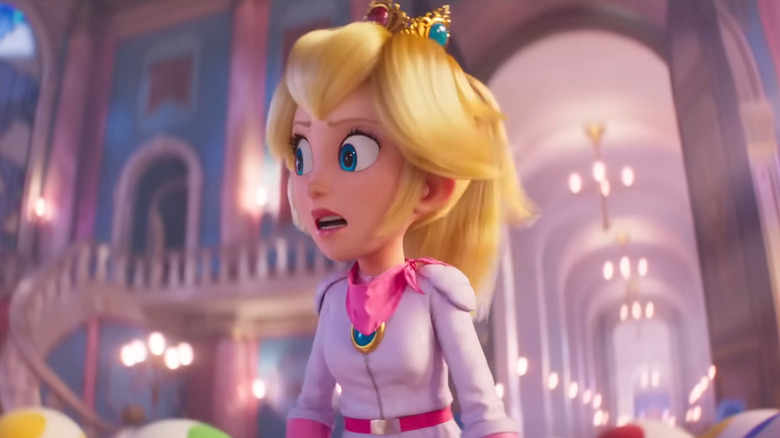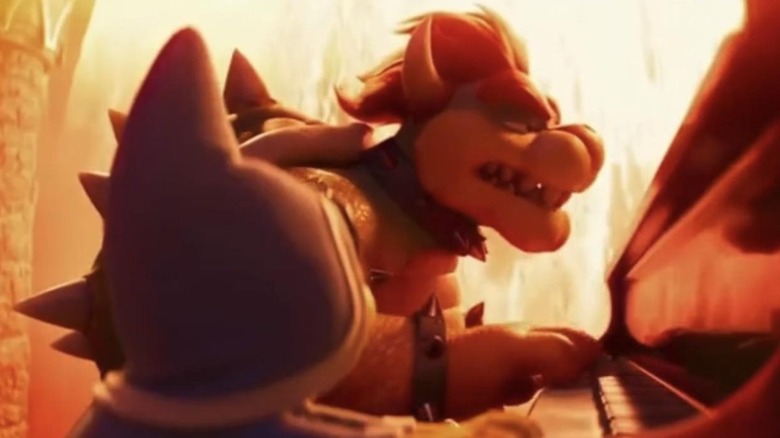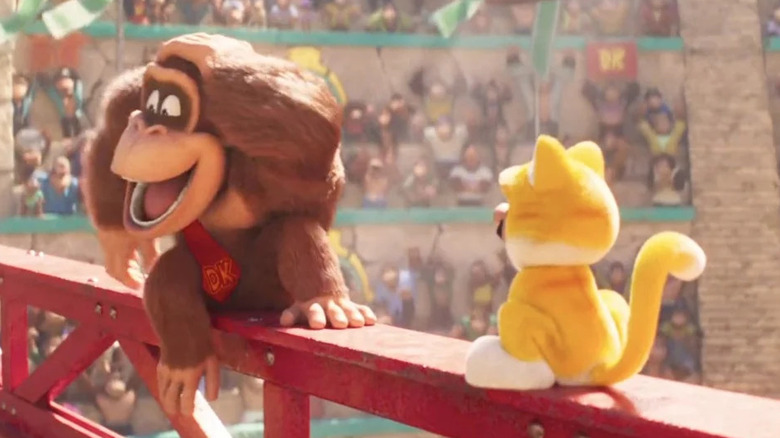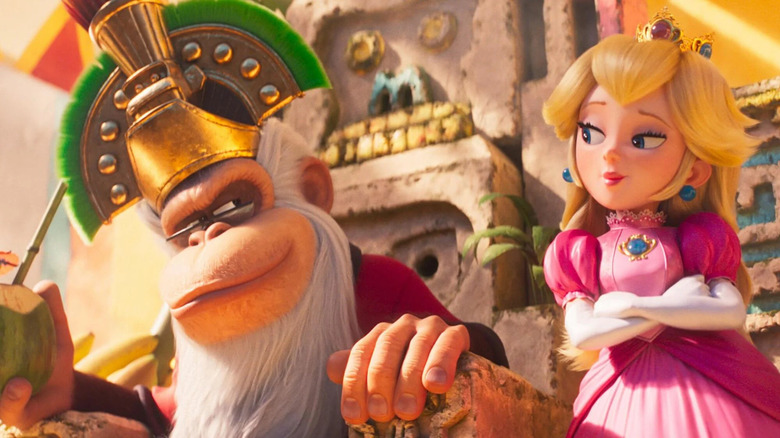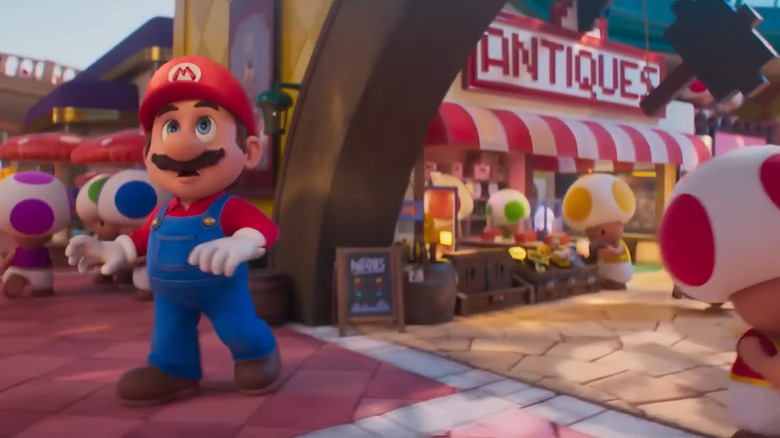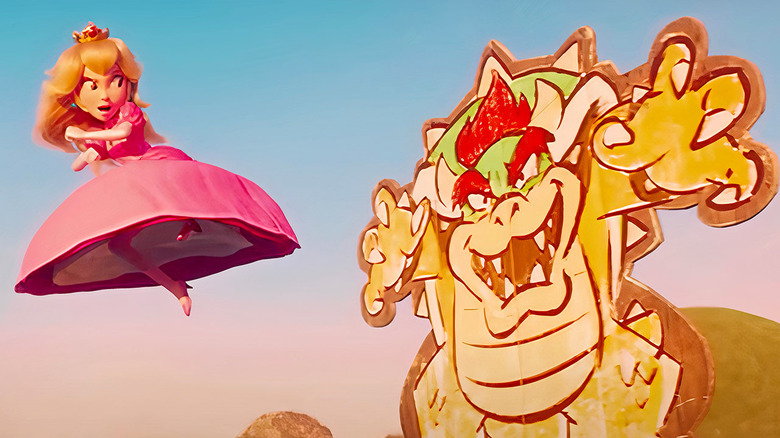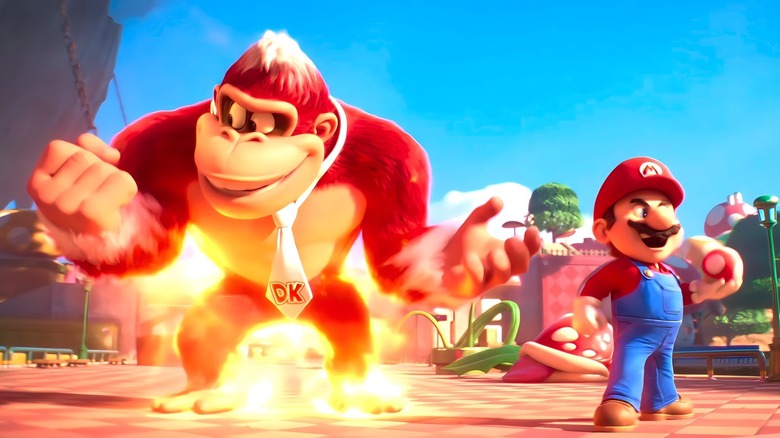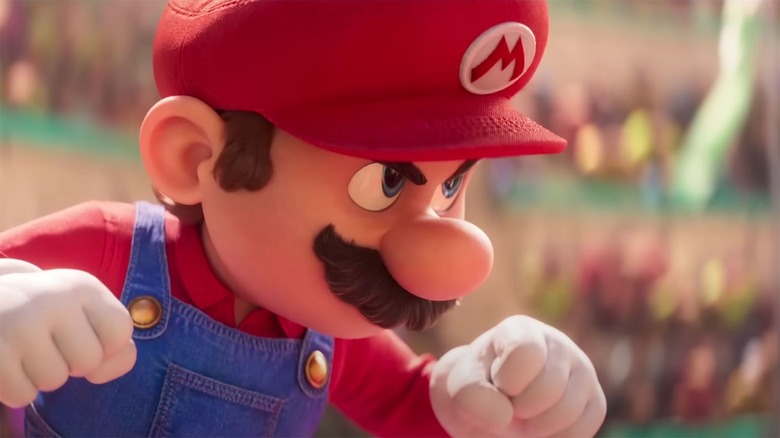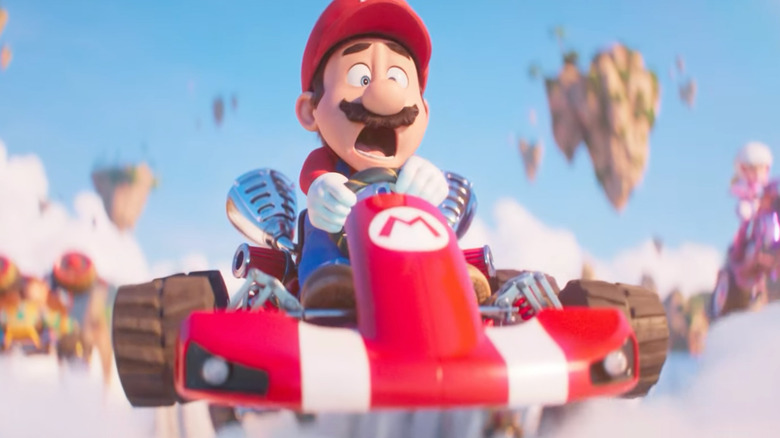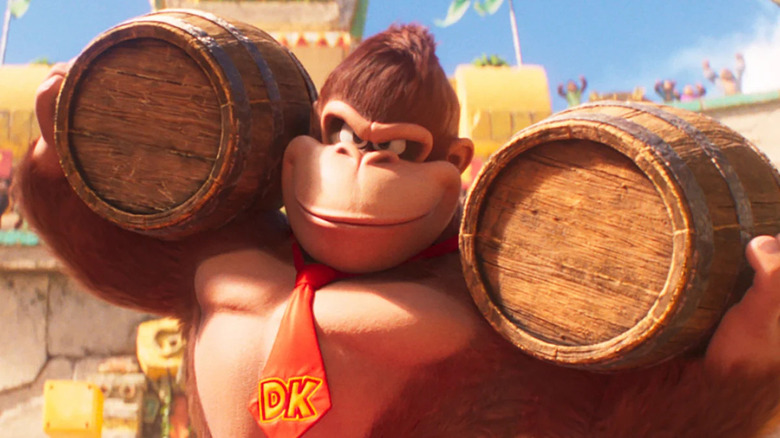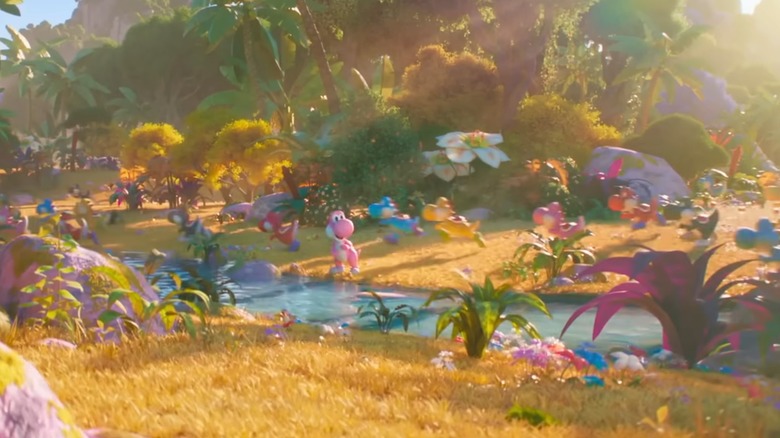The Super Mario Bros. Movie Moments That Upset Fans The Most
Contains spoilers for "The Super Mario Bros. Movie."
At long last, "The Super Mario Bros. Movie" has finally arrived. The film was first formally announced way back in 2018, with Nintendo partnering with Illumination Entertainment, the studio behind "Despicable Me" and "The Secret Life of Pets." Given the history of video game adaptations, fans were wary of how Illumination would handle translating the beloved plumbers to the big screen. Thankfully, Nintendo promised to be closely involved with the film, particularly through co-producer Shigeru Miyamoto, Mario's original creator.
The promotional period for the film was rife with controversy, especially when the celebrity voice cast was announced, indicating to many die-hard "Super Mario Bros." fans that Illumination's direction with the movie would be to appeal to non-video game players. Fortunately, many months later, the first trailers for the movie proved them wrong, showcasing a vibrant Mushroom Kingdom and energetic characters that have clearly been done justice by the minds behind the Minions, likely thanks to Miyamoto's input. The game design legend told Variety that he felt it was "important to visualize what we see in the video games as authentically as possible on the big screen."
Nevertheless, these are video game fans we're talking about, so there was bound to be criticism and nit-picking anyway. Many fans have taken to social media and beyond to voice their concerns about Illumination's adaptation of the "Super Mario Bros." franchise, from its voice acting to its franchise loyalty.
Chris Pratt's casting as Mario remains divisive among fans
Of course, the biggest hurdle "The Super Mario Bros. Movie" has had to jump through is getting audiences acquainted to the idea of Charles Martinet not lending his iconic voice to Mario and Luigi. Instead, Illumination cast "Guardians of the Galaxy" star Chris Pratt as the hero in overalls, which drew significant backlash from fans of the series. Furthermore, the film's early trailers didn't do a great job of showcasing Pratt's take on Mario's famous voice, which Martinet has performed since 1990.
Internet memes rained fury on Pratt, who for what it's worth puts a lot of effort into his Mario voice. During a commercial for Super Mario Bros. Plumbing, he adopts Martinet's iconic, exaggerated Italian, but for most of the movie he speaks in a blue collar Brooklyn accent. Even Pratt shared some concerns, telling Entertainment Tonight he was "as nervous as everybody else that this was gonna get screwed up and ... grateful that it didn't."
While some critics felt Pratt was owed an apology for the way the Internet targeted him, other critics and fans felt the performance was justifiably criticized. The Los Angeles Times called Pratt's performance (as well as Charlie Day's as Luigi) "so unremarkable that it could have been anyone at all." Still, the satisfaction of many other fans shouldn't be ignored by Pratt, who certainly put his best foot forward.
Mario and Luigi spend most the movie separated
While many critics had negativity to hurl in the direction of Chris Pratt and Charlie Day, other fans were surprisingly charmed by the duo's performances. For example, a review for VG247 highlighted Pratt and Day's portrayals of the plumbing brothers, stating, "It's the quiet brotherly chemistry between Pratt's Mario and Charlie Day's Luigi that left the biggest impression." But the fact that there's not enough of that chemistry is one of the movie's drawbacks.
The film kicks off when Mario and Luigi get sucked into a mysterious green pipe, transporting them to a strange new world. The two are separated on their journey, with Mario ending up in the colorful Mushroom Kingdom while Luigi is captured by Bowser's army in the Dark Lands. They don't reunite until the film's finale, when Mario finally rescues his brother with the aid of Peach, Toad, and Donkey Kong. For many fans, it was frustrating that the potential for a Mario and Luigi buddy comedy was wasted in a bid to make Luigi the damsel-in-distress rather than Peach.
It's hard not to imagine a version of "The Super Mario Bros. Movie" where Mario and Luigi spend most of the film together, maybe in conflict with each other before realizing they work best as a team to defeat Bowser. Nevertheless, the duo's camaraderie and compassion for each other certainly comes through in Pratt and Day's performances.
The film's plot is as thin as Paper Mario
The "Super Mario Bros." video games aren't exactly known for their deep stories, aside from RPG entries like the "Mario & Luigi" series or "Paper Mario." For the most part, the plot of a mainline "Mario" game involves Peach (or sometimes, another person or creature) being kidnapped by Bowser, leaving it up to Mario to traverse a vast world chasing down the Koopa King and his minions. If anything, "The Super Mario Bros. Movie" remains pretty loyal to this formulaic narrative structure.
By the time Mario arrives in the Mushroom Kingdom in search of Luigi, Princess Peach is preparing her army for an attack by Bowser, who happens to be Luigi's captor. Mario, Peach, and Toad team up to travel to the Jungle Kingdom, where they recruit the Kong army for their battle against Bowser. Despite some setbacks, they defeat him once Mario and Luigi are reunited.
For some critics of "The Super Mario Bros. Movie," this story resembling a classic Mario adventure wasn't enough to justify its existence as a film adaptation. Vulture, for example, called the film "an almost impressively generic kiddie movie," and that it "might as well have been assembled by a focus group." Perhaps, if Illumination and Nintendo's relationship is to continue, they can use adaptations of titles like "The Legend of Zelda" or "Metroid" to show off their storytelling skills, while "The Super Mario Bros. Movie" can remain a simple, fun kids' flick with lots of Easter eggs.
Peach's backstory is explored, but not fully enough
Anya Taylor-Joy's Princess Peach takes a more prominent role in "The Super Mario Bros. Movie" compared to her in-game appearances, where she's usually Mario's love interest and Bowser's captive. As ruler of the Mushroom Kingdom, Peach is shown to be quite the skilled warrior and military leader, even one-upping Mario in her own training course to show just how far the plumber has to come in physical prowess for their adventure together. Additionally, "The Super Mario Bros. Movie" also delves into Peach's backstory, which the games never do.
During a flashback sequence mid-way through the movie, Peach tells Mario why she feels so protective over the Toads. As a child, she accidentally wandered through a green pipe and ended up in the care of the Toads, who raised her, trained her, and crowned her princess. It's a cute sequence that certainly justifies Peach's motivation for stopping Bowser, but an important question is raised, which is echoed by Mario following the flashback. If Princess Peach isn't from the Mushroom Kingdom, could she be from his world?
Unfortunately, viewers hoping for answers to this question don't get them in this movie, perhaps due to Illumination wanting to save some surprises for a potential sequel or spin-off. Nevertheless, it's understandable if some fans feel slighted that Peach's backstory happens to closely resemble Rosalina's from the storybooks in "Super Mario Galaxy."
Bowser is less threatening than fans think he should be
Though the voice cast of "The Super Mario Bros. Movie" has been critiqued and memed to death, one particular cast member who earns adequate praise is Jack Black as Mario's arch-nemesis Bowser, ruler of the Dark Lands. As indicated by the film's very first teaser trailer, Black puts on quite an aggressive voice to play the king of Koopa, telling IGN he based his performance on Darth Vader.
Thankfully for fans of Black's performances in previous films, the directors of "The Super Mario Bros. Movie" let the actor improvise and make the character his own. This results in scenes like one midway through the movie, when Bowser has a moment alone to play piano and sing about how much he loves and desires Princess Peach, which is reprised in a mid-credits scene after the movie ends. The song was even accompanied by a music video released online, directed by Cole Bennett, who has also helmed videos for Wiz Khalifa, Post Malone, and Blink-182.
Still, some fans of the "Mario" franchise took issue with Bowser's portrayal, feeling that it diminished the threat of the character as depicted in the games. However, other sources like Kotaku praised the choice to make Bowser a pathetic character, noting that his less serious or threatening actions made up some of the movie's funniest moments.
Seth Rogen underwhelms as Donkey Kong
Seth Rogen's casting as Mario's first nemesis, Donkey Kong, was another from the original voice cast announcement that made "Super Mario Bros." fans hopeful. However, the pressure was on shortly afterwards, when rumors began to circulate surrounding a "Donkey Kong Country"-inspired spin-off film, which Rogen later expressed interest in, pointing out that the Jungle Kingdom's vast army of go-karts could make the film potentially reminiscent of the "Fast and Furious" film franchise.
However, Rogen's performance in "The Super Mario Bros. Movie" has left some fans of the character concerned about a possible future. As Rogen expressed in an interview with ComicBook.com, he was upfront with Illumination that he's not a voice actor, claiming, "If you want me to be in this movie, it's gonna sound like me," which rubbed many "Mario" fans the wrong way considering how much efforts performers like Pratt as Mario or Keegan-Michael Key as Toad put into their performances.
Even Rogen's effort on the red carpet of the film's Los Angeles premiere was criticized by fans, with Kotaku pointing out how many of the film's other voice actors, like Anya Taylor-Joy and Jack Black, dressed in outfits reminiscent of their characters, noting, "Gamers just want [him] to put some oomph into it." At the very least, some audiences have enjoyed hearing Rogen's iconic laugh coming out of Donkey Kong, so maybe it was more worth it for some than it was for others.
Fans noticed a major error in the Donkey Kong Country lore
Not all "Donkey Kong Country" fans were charmed by the film's time in the Jungle Kingdom, finding it quite the diversion from the games they're familiar with. In "The Super Mario Bros. Movie," the Jungle Kingdom has a highly-advanced system of go-karts, which becomes their main asset when joining Princess Peach to defend the Mushroom Kingdom from Bowser's army. Their leader, King Cranky Kong, is voiced by "SNL" alum Fred Armisen, who does a fine job, but his character has nevertheless been exposed to criticism from diehard "Donkey Kong" fanatics.
Notably, the film establishes that Cranky Kong is Donkey Kong's father, and their relationship is used to parallel Mario's own relationship with his father. For those who are familiar with the lore of the "Donkey Kong" games, this is a direct contradiction of already-established information, namely that Cranky Kong is supposed to be Donkey Kong's grandfather. Cranky Kong, in the series, is meant to be the original Donkey Kong from the 1981 arcade game, while the red tie-wearing character audiences are familiar with is the son of Donkey Kong Jr., who appears in the arcade game's sequel.
Perhaps the creators of "The Super Mario Bros. Movie" wanted to do away with this complicated family tree, but considering Nintendo's close affiliation with the film, it's surprising that an alteration like this made it through. Nevertheless, having King Cranky Kong be Donkey Kong's father does tie the film together more thematically.
The nostalgia bait and Easter eggs are in full overdrive
"The Super Mario Bros. Movie" certainly warrants several watches just for the various references to Nintendo's video game lineage peppered throughout. From the get-go, Mario and Luigi's hometown of Brooklyn is littered with Easter eggs, such as the "Punch-Out!!"-themed pizzeria, Mario's NES console and Star Fox figurine, and subtle but very noticeable allusions to the "Mario" franchise, from Sunshine Travel Agency to Brooklyn's underground sewers labeled "Level 1-2."
Many reviewers commended the collection of Easter eggs as one of the film's highlights, with Yahoo! describing the movie as "sure to give Nintendo fans young and old reason to smile." However, others weren't as gentle towards the film's overabundance of eye-catching Nintendo references, with one reviewer for The San Francisco Chronicle criticizing "The Super Mario Bros. Movie" and its treasure trove of Easter eggs as "a blandly efficient piece of brand management."
Nevertheless, "The Super Mario Bros. Movie" does make for a good watch for audiences who relish in the finer details, even though many critics felt this took precedence over the film having a structured and coherent plot. Some might view the film as simply a love letter to Nintendo's greatest franchise, while others will likely only remember it as visually overstimulating and lacking in depth.
The film's soundtrack contains a lot of overdone needle drops
There's lots of fantastic music from the "Super Mario Bros." franchise to nab for a film adaptation. Fortunately for fans who are eager to hear their favorite themes interpreted on the big-screen, the movie definitely delivers. The score was composed by Brian Tyler, famous for his work with Marvel Studios and Universal Pictures. According to an interview with Variety, Tyler worked closely with Koji Kondo, the original composer for many of Mario's most iconic fanfares, with the goal being "to have built-in nostalgia where it immediately feels like Mario."
While many fans feel this was executed with flying colors, others blamed Illumination for the addition of several notable needle drops of popular music during key scenes. The choices of songs were definitely intentional, picking hits from the late '70s and early '80s, though many fans felt they stood out compared to the film's other, more subtle music cues. One example is Bonnie Tyler's "Holding Out for a Hero," which some fans noted was used in two other films released in the past month: "Shazam: Fury of the Gods" and "Tetris."
Other odd or overly on-the-nose choices from the film's soundtrack of pop songs include "Take on Me" by a-ha, which scores a go-kart sequence in the Jungle Kingdom, as well as "No Sleep 'Till Brooklyn" by The Beastie Boys, which plays over Mario and Luigi's early scenes in the New York borough.
Power-ups aplenty, awkwardly placed
Many critics and fans have pointed out how "The Super Mario Bros. Movie" mainly appeals to fans of the video game, without much context or easy entry for those who are less familiar with the source material. This especially applies to the film's interpretation of Mario's famous power-ups. In the video games, Mario finds various items in blocks labeled with question marks, which offer him certain abilities which he loses if he's hit. Among his most famous are the Super Mushroom, which allows him to grow in size, and the Fire Flower, which lets him shoot fireballs.
In "The Super Mario Bros. Movie," audiences might be somewhat surprised to learn that power-ups work in exactly the same way. Even the way Peach introduces Mario to Super Mushrooms feels something like a tutorial, with the film's later debuts of power-ups like the Cat Suit, Raccoon Suit, and Ice Flower appearing randomly from question mark blocks rather than getting organically introduced through the film's story. As an article from BBC phrased it, "The directors have given up on making a cartoon which anyone might enjoy, and have concentrated instead on piling on references for the benefit of the games' devoted fans."
Even more positive reviews lamented the lack of translation from the games to the screen when it came to Mario's use of power-ups. Global Village Space, for example, argued, "Nobody is reinventing the blue shell," while commending the film's lack of narrative in place of recreating the authentic "Mario" experience.
The most iconic catchphrases are there, but not always done justice
When one thinks of "Super Mario Bros," many catchphrases and famous quotes probably come to mind. It was important for the movie to incorporate some of these catchphrases, for the sake of staying loyal to the original games as well as hitting the nostalgia factor for audiences young and old. Some of these catchphrases were incorporated well into the final film, including Mario's iconic "It's-a me, Mario!" or Luigi frightfully exclaiming his brother's name.
Others don't feel as natural or fitting when compared to their original appearances in the games. One example comes during a scene in which Mario and Toad are trying to sneak their way into Princess Peach's castle. The two are stopped by a pair of Toad guards, who proudly claim, in a reference to the original NES game, "The princess is in another castle." As The New York Times writes, "It's deployed as a flat, mirthless inside joke."
Another moment that underwhelmed fans comes when Seth Rogen's Donkey Kong, mid-battle with Mario, exclaims, "It is on like Donkey Kong!" The phrase has been used colloquially for years, before being trademarked by Nintendo in 2010. In the context of having the actual character say it, it's bafflingly on-the-nose.
The Super Mario Bros. Movie falls flat compared to recent animated releases
It's no secret that the world of animation is entering a renaissance. Many film critics trace this back to the release of "Spider-Man: Into the Spider-Verse" in 2018, with that surprise hit incorporating uniquely stylistic comic book-esque animation with sharp writing and a stellar voice cast. The trend has continued with releases like Phil Lord and Chris Miller's "The Mitchells vs. the Machines," Guillermo del Toro's Oscar winner "Pinocchio," and DreamWorks' "Puss in Boots: The Last Wish."
As Mashable argued in an article praising the art of animated films, "Animations are not lower quality works of art that beg to be repurposed into live-action films for a new generation." Meanwhile, the filmmakers of Illumination Entertainment have been notable for their commercially successful projects, even when they're not as commercially hailed. As "The Super Mario Bros. Movie" co-producer Chris Meledandri told The New York Times in 2011, his company's success has been attributed to "Very few management layers, clear decision-making, [and] shortening the length of time you spend developing a movie."
In recent reviews, "The Super Mario Bros. Movie" has been acclaimed for its visuals and animation but, like previous Illumination films, panned for its narrative. In an age of animated films garnering raves from critics and fans of all ages, "The Super Mario Bros. Movie" may not be up to the industry's standard.
A beloved Nintendo composer goes uncredited
Although many Nintendo fans are particularly satisfied with the music of "The Super Mario Bros. Movie," one slip-up by both Nintendo and Illumination has rubbed many longtime fans the wrong way. Notably, the film uses the "DK Rap" from "Donkey Kong 64" during the character's introduction midway through the film, which was something Seth Rogen strongly advocated for. In an interview with Den of Geek, Rogen recalled, "I remember ... demanding they allow me to sing it," though was surprised to see the song made the film's final cut.
The "DK Rap" was originally composed by Grant Kirkhope, with lyrics by George Andreas, for the 1999 Nintendo 64 game. Kirkhope is notably a beloved video game composer, known for his work on titles by Rare, including "Banjo-Kazooie," "Goldeneye 007," and "Perfect Dark." However, Kirkhope and Andreas did not receive credit for writing the "DK Rap" in "The Super Mario Bros. Movie," as the film's end titles simply cite the song as originating in "Donkey Kong 64."
Once fans notified Kirkhope of this misstep via social media, the composer took to Twitter to express his disappointment, saying, "I was really looking forward to [seeing] my name in the credits for the DK Rap, but alas as expected it's not there." Many diehard Nintendo fans have rallied behind Kirkhope, given that his lack of credit seems like a painfully obvious mistake by the filmmakers. Hopefully it can be resolved in future releases of the film for home viewing.
The post-credits scene teases a character who's already in the movie
Although the movie contains more than enough to satisfy longtime fans of Nintendo's biggest and most iconic franchise, there's still so much to look forward to in a potential follow-up. In an interview with Variety, Meledandri attempted to defuse talk of a sequel, saying, "At this time, we're not prepared to talk about what's coming in the future." Nevertheless, in a Marvel-esque fashion, staying until the very end of the credits at the end of "The Super Mario Bros. Movie" will offer a look at things potentially to come.
In the depths of Brooklyn's sewage system, as explored by Mario and Luigi during the film's first half, a lone Yoshi egg can be seen amidst rubble in the post-credit scene, just starting to crack. This is sure to delight "Super Mario Bros." fans who were disappointed by the lack of screen time for Yoshi. However, some who watched the movie were keen to point out that teasing Yoshi is quite fruitless when other members of his species already appear in the movie, during Mario, Peach, and Toad's adventure to the Jungle Kingdom. It does sort of undercut the big reveal when the Yoshi race already appear previously in the movie. Still, it does its job of setting up fan expectations for where a second "Super Mario Bros. Movie" could go.
